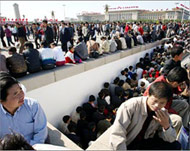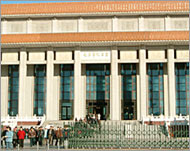Tiananmen, a fading memory
Next month will mark the 15th anniversary of the Tiananmen Square confrontations.

But how will 4 June, the day the Chinese government dramatically crushed pro-democracy protests, be commemorated and how is it remembered by those who were there?
“There was so much excitement, a sense of newness about what was happening, such an upbeat mood among people,” recalls Richard Baum, director of Chinese Studies at UCLA.
“People were just happy to be involved, to have that sense of involvement; nobody knew how it would end.”
Blank diary
As far as anniversaries go, 4 June, the day on which the tanks unexpectedly rolled in to Tiananmen Square and the world watched as hundreds, maybe thousands, of students died is likely to be remarkable for being uneventful.
Like the 14 anniversaries before it, security measures will be beefed up, dissidents monitored and the press, which rarely if ever discusses the topic, carefully screened.
Individuals who go to the square will most likely, as in previous years, find it closed and any who try to mark the event through some physical action will be escorted away.
Those imagining that the city is about to come alive in an act of collective remembrance, will be disappointed. Yet many argue that what happened in 1989 was one of the most controverisal acts in China’s recent history.
Old news
China, as people interviewed liked to say, “has moved on”. People are now “forward looking” and see no point in dwelling on past events, particularly when such dwelling achieves nothing.
In fact, some of those asked had not made any commemorative connection between this year and 1989, nor saw any purpose in doing so.
|
“For me, it is just a memory, like a dream. former demonstrator |
Even among former demonstrators, the sense of occasion has gradually lessened given time. “For me, it is just a memory, like a dream. I wake up and I feel like I am in another world,” said one former demonstrator.
Now a professional artist, he was then a student at the Central Academy of Art. Initially moving abroad in 1990, he rarely discusses the events of that summer, except with close friends who shared his experience.
Describing how after they heard that the soldiers had entered the square, he and his fellow students went outside, only “to see terrible things” whereupon they retreated back to their dormitory.
“Most of the time, we don’t want to mention it, we want to forget about the past, but this does not mean that we don’t care.”
Professor Andrew Nathan, editor of The Tiananmen Papers, an analysis of the confrontation using official documents, agrees.
“For most people, they figure it is the past, it’s a forbidden topic and it’s not worth talking about. For many younger people, it happened before they were out of childhood.”
Crackdown
Officially described as a “counter-revolutionary movement”, there has yet to be any form of public reassessment into the government’s role despite annual petitions from relatives of those who died.
 |
|
Tiananmen Square, this time full |
In answering a related question at a press conference in April, Chinese premier Wen Jiabao, who himself visited the square in 1989, restated the official line that given the “serious political disturbance” and the threat to national unity, the measures taken were appropriate.
“I don’t believe the extent of the claims made by the government regarding a national chaos,” says Nathan.
“I do believe that had the party negotiated, it would have led to some deep changes in the single-party system. How these changes would have ended is hard to foresee.”
Rather than risk reassessment with its potential political consequences, time has been allowed to pass with the memories of 1989 becoming distorted or forgotten.
Fading memories
“We don’t really talk about it,” says a young law student, Anna. “For me, although a child, I remember it happening because I lived in Beijing at the time. It sounded like firecrackers going off.”
She explained though that for some non-Beijing students in her class, when the issue of Tiananmen is raised, they are shocked to hear that people died.
“Some of the younger generation has grown up thinking it ended peacefully. They believe what their parents and teachers told them.”
Even among those who witnessed the protests that took place not just in Beijing but also across China, a degree of accommodation of what happened has developed.
The government line that, had they not intervened, the country would have fallen apart just like Eastern Europe and the USSR were doing at the time has gained credence, and helped muddy the waters as to what took place.
Acceptance
“Among people I know, even though we all saw the protests, there has been an acceptance that what happened had some justification for it,” says Maggie, who in 1989 was a student in the central Chinese city of Nanjing.
Sympathisers point not just to the examples of the former Soviet Union, but also to the impressive economic growth figures that China has maintained throughout the 1990s, figures that some argue would not have been possible except under a strong, one-party leadership.
 |
|
People leaving Mao Zedong’s |
“It is disturbing for people to accept what happened. It is much easier for people, particularly the younger generation, to distance themselves from the horrors of reality,” Richard Baum, director of Chinese Studies at UCLA says.
At a time when many commentators predicted that the Communist party system would collapse, the government was not only able to survive the fall out of Tiananmen but, through gradual economic and political reforms, able to strengthen its legitimacy.
“Immediately after Tiananmen, there was a widespread feeling among people that the country had come close to chaos and they didn’t like that. Since then, there has been an aversion towards political confrontation,” says Baum.
Relative prosperity
Coinciding with a period of unprecedented economic growth, minds have been focused away from the late 1980s and on to how to take advantage of the new opportunities offered.
|
“Since 4 June, China’s transformation has been so rapid, so intensified that it is easy to forget the details of 1989” Richard Baum,director of Chinese Studies, UCLA |
“Since 4 June, China’s transformation has been so rapid, so intensified that it is easy to forget the details of 1989,” adds Baum.
“If you take all of Chinese history, Tiananmen has merely become the blink of an eye, and one that can be forgotten given the change the country has seen since then.”
The result has been that 1989, although still discussed among the Chinese, has lost much of the emotion that was once attached to it.
“What is there to say any more?” asks Maggie. “Times have changed and people have moved on.”